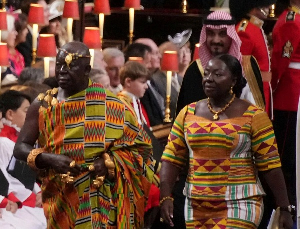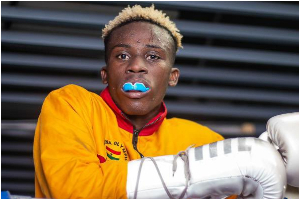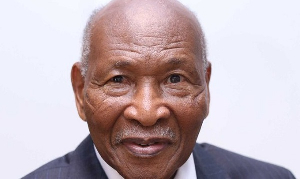Opinions of Thursday, 13 April 2023
Columnist: Lenny Kuuku Simmons
The Fall of Prophet Uebert Angel and the lesson for the church
The latest episode of investigative journalism by Al Jazeera, titled The Gold mafia, brought shockwaves across the Christian consciousness in Africa. Amid conmen, gangs, money launderers, is the continent’s most branded prophet, Uebert Angel, the man who makes money-miracle rain for Charismatic Christians.
The exposé on Uebert Angel was like the fall of Gondolin. Like that ancient mountain hall which fell by the hand of Morgoth, Uebert fell by the hand of Mammon. His demise from the Al Jazeera’s exposé echoed deeply in our hearts and lands like the crash of many waters. He thought his end would not go in the way of his spiritual father, Bushiru. After all, he had diplomatic cover. He thought he could operate a syndicate in the shadows without being caught. How wrong he was.
Sanctions have made it impossible for Zimbabwe to sell gold globally. So in Uebert’s mind, Zimbabwe needed saving from economic collapse, and he would be that savior. He believed it wasn't enough to be the prophetic voice for Zimbabweans; he had to be its Robinhood also. He would use any means necessary—covet and black market operations—to kick-off the economy. He didn't know that saving Zimbabwe using black market operations would jeopardize his work in Zion.
Aside from helping Zimbabwe and obviously, himself, Uebert and some men of God who operate like him think that God needs saving. “The gospel, though free, is expensive,” they say. They have to find any means necessary to fund it. Tithe and offerings have come under scrutiny in recent years. And church members are not supporting the church as they should. With financial problem looming, some of them have decided to take matters into their own hands instead of turning to the God who called them. Because of this, an ideology has engulfed them into thinking that, to fund the gospel, they must operate a scheme behind the scene?
Can’t God, the creator of the universe, finance His own church?
In the past, businessmen and women would go out there and bring deals for men of God to vet for them. Papa, "should I go ahead and do this deal," they would asked. Now, men of God have become the forerunners in the business terrain, operating various schemes. They used to be the people telling Christian businessmen and women to walk away from shady deals, now they do dirtier deals themselves.
Uebert's philosophy says we have to get the cash at all costs. A man of God of his caliber cannot live like this. He didn't think about the side effect of his money moves on Christian consciousness. I guessed he trusted in his diplomatic cover and prophetic gift, his ability to see as an eagle to protect him from any downside.
Uebert did not count the true cost. In principle he would agree that a good name is better than riches. But he lived a life that contradicted this. His life says, “riches are better than a good name” or “ill-gotten riches can buy me a good name.” The rest of the world may live by this philosophy, but not Christians, and certainly not for a prophet of his caliber, a prophet who branded himself as the face of the African prophetic movement.
Ordinary men who were not men of God had chances to make quick money, and they
looked away. The opportunity cost and the trade-off were too high. For instance, Dangote protected his brand and turned it into an empire. He said, “l stayed away from oil for a very long time, in order not to taint the brand. l knew the corruption in Nigerian oil, and l didn’t want to be part of that.”
On the other hand, Uebert lived as if he had no brand to protect. Perhaps in his eyes, Christ's name was not worth preserving, nor was his access to the Spiritual fathers of Africa. His followers did not matter to him. He didn’t count all these before meeting Al Jazeera's mafias. I guessed Mammon had blinded his heart, for he could no longer see from afar.
I know the arguments put forward by Uebert's supporters: “the white man is corrupt too. He stole from our ancestors, so it's time to steal from him. The black money is coming from the West, so who is the thief here, the gold seller or the black money holder? Zimbabwe needs a way out of sanctions, a way to survive.”
However, these arguments do not absolve Uebert of his involvement with global mafias. Men of God have a responsibility to uphold, higher than the rest of the world. If Uebert decided to go low with his principles, he shouldn't have branded himself as the face of African Christianity when behind the scenes, he deals with mafias. Uebert uses black market practices to amass wealth and lead a luxurious lifestyle, yet he tells Christians globally to look out for miracle money.
The Christian celebrity brand is sensitive and costly. It is an anti-scandal status. It operates in the marketplace of ideas, ideals, and enlightenment, not entertainment. This type of status, which Uebert has achieved, cannot be equated to Hollywood celebrities. While the latter sometimes thrives on bad news, the former thrives on the good. Hollywood celebrities may weather scandals and emerge unscathed, with fans forgiving them.
However, for a man of God with stature, the odds are against you. Similarly, politicians may withstand scandals that a man of God may not. Men of God do
not have that mileage. They are the moral gatekeepers of society. The embodiment of the ideal man, making it the most delicate spot of all. Thus, viewing Politicians and ministry celebrities through the same lens would be a mistake.
The president’s niece and other stakeholders involved in the Gold mafia episode may survive. The same cannot be said for Uebert. His critics have begun to throw punchlines, alleging that God had punished him for his greed and folly. Some even say, 'We saw his downfall long ago; this self-styled prophet is a fraud like Hush Puppy.' But is Uebert truly a Hush Puppy? I think not. Others are
asking, "Was he a genuine or false prophet? Did the church fathers err in associating with him? Were they aware of his syndicate? What should we believe now, and who should we follow?"
To answer some of these questions, we must revisit the time of his appointment as ambassador-at-large. Did he use his prophetic influence to secure the post, or was it conferred on him by God? As his fans, you may answer in the affirmative, but your response may stem from emotions, not facts. Because if his appointment was not God's will, then he was destined to fail from the outset. A perfect storm to bring him down. And if so, then the president did him no favors.
Suppose it was God then what happened? Greed? Ambition? I don’t know. One of the essence of religion is to find God and receive guidance and wisdom to help us
navigate life's journey. After all, none of us have been here before, and even if we believe in reincarnation, we still do not know our past life. Seeking God for direction can bring clarity and certainty amid the uncertainties of life. Only the God of truth has the answer to our doubts and life's big questions. Only He could have known that the Chinese mafias were not mafias at all; they were Al Jazeera journalists.
However, when prophets usurp God and make decisions for nations, the church suffers. The nations suffer. Wasn’t Uebert Angel better off serving his country and the world as a seer than as a mafia? Uebert's scandal will continue to plague the church until we let go of our desire to control everything and instead entrust decisions to God, whether we are the Pope, archbishop, prophet, or priest. We must hand over the decision touch to the Holy Spirit.
The church should embrace the old ways and stop relying on fallible prophets for
guidance. Few among them have detached themselves from the material world. It is
evident that the prophetic gift is not akin to Sauron's ring, the one ring to rule them all. The prophetic gift is not the one gift to rule us all; it has its limitations, and prophets must recognize this and remain dedicated to their calling. Church leaders must walk in their lane, stick to their calling, and avoid the temptation to act like they know everything, understand everything, and must be involved in everything.













